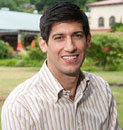For much of Sunday’s epic Wimbledon Final Andy Roddick outplayed Roger Federer. Roddick out served Federer, played with more intensity, and had a number of incredible winners (including many backhand winners to Federer’s forehand side). So, how did Federer manage to beat an opponent who played exceptionally well and, in some way, wanted the Wimbledon Championship more than Roger himself? Federer simply outlasted Roddick.
Let’s face it, as the London Time’s Simon Barnes suggested, Roddick was hurling thunderbolts in the manner of Zeus well into the early evening, yet Federer was able to capitalize on a few missed shots in the 15-14 game to quickly win the match and his 15th Grand Slam championship. In the end, Federer was just better at accomplishing the specific goal at hand: winning the tennis match.
Federer’s mesmerizing style and talent reminded me of how important it is in life to stay on track and focus on particular goals. More specifically, Roger is a great example of the type of good short sightedness needed to achieve any practical life goal whether it be winning a tennis match, saving for a home, raising a child, or excelling at your job. Tuning out big picture goals for the sake of a MICRO-GOAL, such as winning a tennis match, however, is much harder than it appears. For example, think of all the random thoughts Federer may have had twirling in his brain at the time of the match:
“Man, Nadal isn’t in this tournament, I really need to win now”
“I beat Roddick in two Wimbledon finals, why is he playing so well today”
“I just can’t get a rid on his serve and he’s hitting cleaner shots than I am today, it’s not going to be a good day because I usually hit cleaner and can break serve”
“All these tennis legends and the media expect me to win and get number 16, what will the world think if I don’t win”
“The wind is starting to pick up and the light is fading, can I outlast this guy? Maybe I should slow down the pace or pick up my energy level and try to go for outright winners”
Now, I don’t have a window into Federer’s brain (only he knew what he was thinking on Sunday) but his keen ability to simply win the tennis match; namely, keep the ball between the lines until your opponent makes an error or misses a shot is a superb practical life skill. Here are a few others that may help you achieve a few goals of your own (albeit maybe less impressive than 16 Grand Slam tennis championships):
1. Tune out unimportant variables. When you want to achieve something specific it’s not good to act or think philosophically. The big picture is actually your enemy.
2. Don’t change your style or approach if it works most of the time. For example, if you’re a good saver and have had success with investing in low risk vehicles (like a traditional savings account, CD, bond, etc.) don’t begin buying large quantities of securities because the current trend is big returns on your money. In the long run, you’ve probably picked an approach that has worked and switching tactics will not get you closer to a particular goal.
3. Surround yourself with people who think like you.
4. Avoid panic until the last possible moment. Staying calm is a great life skill; in addition to preserving your blood pressure and heart the ability to maintain a calm mind helps you stay relaxed and avoid pressure and a muddled perspective (remember you want laser like clarity on your end goal). Having said the above, I do advocate letting the steam escape at some point.
5. Prepare. If you know how to do it and have proved to yourself that you can achieve a goal then doing it again is a matter of being well prepared.



In my opinion, that is what defines a champ: accomplishing the end goal and winning the match! Great player Roger Federer!